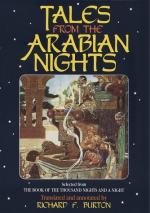[FN#11] Arab. " ’Ajwah,” enucleated dates pressed together into a solid mass so as to be sliced with a knife like cold pudding. The allusion is to the dough-idols of the Hanifah tribe, whose eating their gods made the saturnine Caliph Omar laugh.
[FN#12] Mr. Payne writes “Julned.” In a fancy name we must not look for grammar, but a quiescent lam (l) followed by nun (n) is unknown to Arabic while we find sundry cases of “lan” (fath’d lam and nun), and Jalandah means noxious or injurious. In Oman also there was a dynasty called Julandah. for which see Mr. Badger (xiii. and passim).
[FN#13] Doubtless for Jawan-mard—un giovane, a brave See vol. iv., p. 208.
[FN#14] Mr. Payne transposes the distichs, making the last first. I have followed the Arabic order finding it in the Mac. and Bul. Edits. (ii. 129).
[FN#15] Al-Irak like Al-Yaman may lose the article in verse.
[FN#16] Arab. “Ka’ka’at”: hence Jabal Ka’ka’an, the higher levels in Meccah, of old inhabited by the Jurhamites and so called from their clashing and jangling arms; whilst the Amalekites dwelt in the lower grounds called Jiyad from their generous steeds. (Pilgrimage iii. 191.)
[FN#17] Al-Shara’, a mountain in Arabia.
[FN#18] See vol. vi., 249. “This (mace) is a dangerous weapon when struck on the shoulders or unguarded arm: I am convinced that a blow with it on a head armoured with a salade (cassis caelata, a light iron helmet) would stun a man” (says La Brocquiere).
[FN#19] Oman, which the natives pronounce “Aman,” is the region best known by its capital Maskat. These are the Omana Moscha and Omanum Emporium of Ptolemy and the Periplus. Ibn Batutah writes Amman, but the best dictionaries give “Oman.” (N.B.—Mr. Badger, p. 1, wrongly derives Sachalitis from “Sawahily”: it is evidently “Sahili.”) The people bear by no means the best character: Ibn Batutah (fourteenth century) says, “their wives are most base; yet, without denying this, their husbands express nothing like jealousy on the subject.” (Lee, p. 62.)
[FN#20] The name I have said of a quasi-historical personage, son of Joktan, the first Arabist and the founder of the Tobba ("successor”) dynasty in Al-Yaman; while Jurham, his brother, established that of Al-Hijaz. The name is probably chosen because well-known.
[FN#21] Arab. “Hakim”: lit. one who orders; often confounded by the unscientific with Hakim, doctor, a philosopher. The latter re-appears in the Heb. Khakham applied in modern days to the Jewish scribe who takes the place of the Rabbi.
[FN#22] As has been seen, acids have ever been and are still administered as counter-inebriants, while hot spices and sweets greatly increase the effect of Bhang, opium, henbane, datura &c. The Persians have a most unpleasant form of treating men when dead-drunk with wine or spirits. They hang them up by the heels, as we used to do with the drowned, and stuff their mouths with human ordure which is sure to produce emesis.




